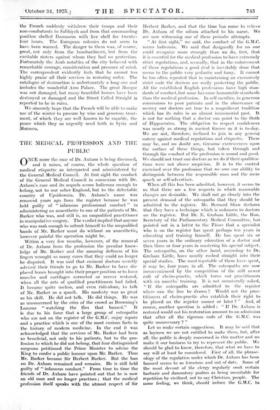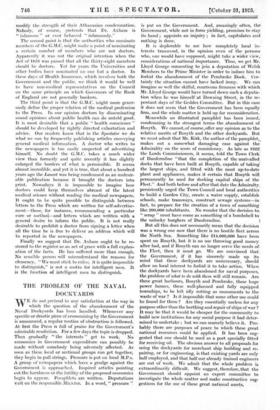THE MEDICAL PROFESSION AND THE PUBLIC O NCE more the case
of Dr. Axham is being discussed, and it raises, of course, the whole question of medical etiquette as interpreted and administered by the General Medical Council. At first sight the conduct of the General Medical Council in connexion with Dr. Axham's case and its sequels seems ludicrous enough to belong, not to our sober England, but to the delectable country of Upsidownia. Dr. Axham's name was removed years ago from the register because he was held guilty of " infamous professional conduct " in administering an anaesthetic to one of the patients of Mr. Barker who was, and still is, an unqualified practitioner in manipulative surgery. The verdict implied that anyone who was rash enough to submit himself to the unqualified hands of Mr. Barker must do without an anaesthetic, however painful the operation might be. ONCE more the case of Dr. Axham is being discussed, and it raises, of course, the whole question of medical etiquette as interpreted and administered by the General Medical Council. At first sight the conduct of the General Medical Council in connexion with Dr. Axham's case and its sequels seems ludicrous enough to belong, not to our sober England, but to the delectable country of Upsidownia. Dr. Axham's name was removed years ago from the register because he was held guilty of " infamous professional conduct " in administering an anaesthetic to one of the patients of Mr. Barker who was, and still is, an unqualified practitioner in manipulative surgery. The verdict implied that anyone who was rash enough to submit himself to the unqualified hands of Mr. Barker must do without an anaesthetic, however painful the operation might be. Within a very few months, however, of the removal of. Dr. Axham from the profession the peculiar know- ledge of Mr. Barker and the amazing deftness of his fingers -wrought so many cures that they could no longer be disputed. It was said that eminent doctors secretly advised • their friends to go to Mr. Barker to have dis- placed bones brought into their proper position or to have muscles and cartilages corrected or nerves restored, when all the arts of qualified practitioners had failed. It became quite useless, and even ridiculous, to talk of Mr. Barker as a quack. His modesty was as great as his skill. He did not talk. He did things. He was as unconcerned by the cries of the crowd as Browning's Lazarus " watching the flies that buzzed." It is due to his fame that a large group of osteopaths who are not on the register of the G.M.C. enjoy repute and a practice which is one of the most curious facts in the history of modern medicine. In the end it was acknowledged that the services of Mr. Barker had been so beneficial, not only to his patients, but to the pro- fession to which he did not belong, that four distinguished surgeons petitioned the Prime Minister to advise the King to confer a public honour upon Mr. Barker. Thus Mr. Barker became Sir Herbert Barker. But the ban on Dr. Axham remained and remains. He is still held guilty of " infamous conduct." From time to time the friends of Dr. Axham have pointed out that he is now an old man and no longer practises ; that the medical profession itself speaks with the utmost respect of Sir Herbert Barker, and that the time has come to relieve Dr. Axham of the odium attached to his name. We are now witnessing one of these periodic attempts. " At first sight," we said, the conduct of the G.M.C. seems ludicrous. We said that designedly for no one could recognize more strongly than we do, first, that it is essential for the medical profession to have extremely strict regulations, and, secondly, that in the enforcement of these regulations a good deal is inevitably done that seems to the public very pedantic and fussy. It cannot be too often repeated that in maintaining an excessively strict code the doctors are really protecting the public. All the established English professions have high stan- dards of conduct, but none has more honourable standards than the medical profession. In self-sacrifice, in generous concessions to poor patients and in the observance of secrecy our doctors are true to a magnificent tradition which has its rules in an almost immemorial past. It is not for nothing that a doctor can point to the Oath of Hippocrates. The obligation to respect confidences was nearly as strong in ancient Greece as it is to-day. We are not, therefore, inclined to join in any general outcry against medical regulations and etiquette. There may be, and no doubt are, tiresome excrescences upon the surface of these things, but taken through and through the conduct of the profession is sound and good. We should not trust our doctors as we do if their qualifica- tions were not above suspicion. It is to the control exercised over the profession that we owe our ability to distinguish between the responsible man and the mere quack or self-advertiser. When all this has been admitted, however, it seems to us that there are a few respects in which reasonable changes are desirable. We shall not go closely into the present demand of the osteopaths that they should be admitted to the register. Mr. Bernard Shaw declares that they have a technique which is unknown to doctors on the register. But Dr. E. Graham Little, the Hon. Secretary of the Parliamentary Medical Committee, hat pointed out in a latter to the Tines that a specialist who is on the register has spent perhaps ten years in educating and training himself. He has spent six or seven years in the ordinary education of a doctor and then three or four years in mastering his special subject. The osteopaths, on the other hand, according to Dr. Graham Little, have mostly rushed straight into their special studies. The most reputable of them have spent, it may be, four years in all. The osteopaths are now inconvenienced by the competition of the still newer cult of cheiro-practic, which turns out practitioners with six months' training. It is not unnaturally asked, " If. the osteopaths are admitted to the register where can the line be drawn ? Would not the prac- titioners of cheiro-practic also establish their right to be placed on the register sooner or later ? " And, of course, another question is added : " If Dr. Axham is restored would not his restoration amount to an admission that after all the rigorous code of the G.M.C. was quite unnecessary ? " Let us make certain suggestions. It may be said that as laymen we are not entitled to make them, but, after all, the public is deeply concerned in this matter and we make it our business to try to represent the public. We should be glad to know, therefore, that what we have to say will at least be considered. First of all, the phrase- ology of the regulation under which Dr. Axham has been banned seems to us ferocious and out of date. Some of the most devout of the clergy regularly omit certain barbaric and damnatory psalms as being unsuitable for repetition by civilized, not to say Christian, people. The same feeling, we think,• should induce the G.M.C: to modify the strength of their Athanasian condemnation. Nobody, of course, pretends that Dr. Axham is " infamous " or ever behaved " infamously."
The second point is that the authorities who nominate members of the G.M.C. might make a point of nominating a certain number of members who are not doctors. Apparently it was not the original intention when the Act of 1858 was passed that all the thirty-eight members should be doctors. Yet for years the Universities and other bodies have nominated no one but a doctor. In these days of Health Insurance, which involves both the Goverrunent and the public, we think it would be well to have • non-medical representatives on the Council on the same. principle on which Governors of the Bank of England are not generally. bankers.
The third point is that the G.M.C. might more gener- ously define the proper relation of the medical profession to the Press. In our opinion doctors by disseminating sound opinions about public health can do untold good. It is most desirable that a public " health conscience " should be developed by rightly directed exhortation and advice. Our reader's know that in the Spectator we do what we can by frequently publishing articles conveying general medical information. A doctor who writes to the newspapers is too easily suspected of advertising himself. No doubt the G.M.C. takes a much wider view than formerly and quite recently it has slightly enlarged the borders of what is permissible. It seems almost incredible, and yet it is true, that about a hundred years ago the Lancet was being condemned as an undesir- able publication because it brought the doctors into print. Nowadays it is impossible to imagine how doctors could keep themselves abreast of the latest medical science without reading the medical newspapers. It ought to be quite possible to distinguish between letters to the Press which are written for self-advertise- ment—those, for instance, recommending a particular cure or method—and letters which are written with a general desire to inform the public. It is not really desirable to prohibit a doctor from signing a letter when all the time he is free to deliver an address which will be reported in the newspapers.
Finally we suggest that Dr. Axham ought to be re- stored to the register as an act of grace with a full explan- ation of the facts. He has suffered more than enough. No sensible person will misunderstand the reasons for clemency. "We must stick to rules; it is quite impossible to distinguish," is not a motto for intelligent men. It is the function of intelligent men to distinguish.































































 Previous page
Previous page